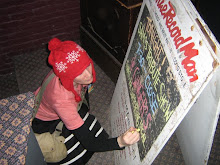I feel a little weird writing about Tanya Davis, though this blog entry is something that has been rolling around in my brain for years now, in bits and pieces. I feel weird because I know her – not at all well, only very peripherally – and I find her writing so emotionally and personally affecting that I actually feel sort of strange and bare when I run into her in Halifax. I don’t know of another songwriter who is so vulnerable in her writing, and I don’t know of another songwriter who speaks to me in quite the same way.
I was introduced to Tanya Davis’ music when I worked at Sam the Record Man. She brought in a copy of the recently released cd, “Make a List,” to be sold on consignment there. My friend and co-worker Jonathan suggested I listen to it; he thought I’d like her. “She calls these song-poems,” he said, rolling his eyes, and then he quickly added, “But it’s really good!”
And I couldn’t get enough. On days when I was confined to the third floor I would sit there and replay that cd for hours. I’d never heard anyone speak about loneliness that way. There was hope, too, and constant lists, so many lists, of reasons to do what you do, things you should be doing, ways that people can be known, ways in which they aren’t enough, all of the dark and light little corners of human experience seemed to there, spoken and sung in this fragile, honest little voice. It was truly revolutionary for me. It used to make me think about the excitement with which Jon Landau had famously declared, “I saw rock and roll’s future and its name is Bruce Springsteen.” There was that same experience for me and I remembered why I loved music so much, why I felt such a connection to certain artists and songs. Sure, there’s nothing new about what Tanya Davis has to say. What’s new is that she says it with such earnestness, with such a lack of pretension or self-censorship that it feels so remarkably different from anything that anyone else is saying.
Tanya Davis has been getting a lot of attention lately, and this makes me very happy. The Andrea Dorfman-directed video for her poem, “How to be Alone” has been everywhere on the internet, and viewed/heard and enjoyed by bigshots like Roger freakin’ Ebert, even! This is not a sad poem and it is not about being lonely, despite what some critics have seen in it. But a lot of what she writes is about about being lonely, and about being sad, and I believe she does an excellent service for humankind by articulating these experiences so unself-consciously.
It is hard to pick, but I picked gorgeous morning, for “It wasn’t worth those happy breakfasts that I missed.” Truth.
Gorgeous Morning - Tanya Davis
some of the people thought that I was crazy
for leaving all that
but they didn't see me at seven in the morning
in the months before i left
within a few minutes of opening my eyes
there was the dread of the day
sitting by my bed waiting for me to rise
and pretend like everything was okay
and it makes for bad digestion when you are crying onto your toast
and if that's how breakfast goes you know you're in for it
but i had no intentions then, go to work and come back home
my feet heavy and slow every minute of it
i could be a person climbing up the ladder
and checking the right boxes
moving through the brackets higher and higher
with more gains than losses
and i could have a cottage in a pretty spot
and make it there twice a year
all the other months in the city with my job
and my money and my tears
the glory of the morning did fade and dim
where once it was my best love and i was so grateful for it
but those days working with no passion did change all of this
and it wasn't worth the happy breakfasts that i missed
so on one gorgeous morning i told them i was leaving
and it was so relieving to say it out
and i worked hard all afternoon and the weeks before the leaving
until finally one evening was my last walk out



